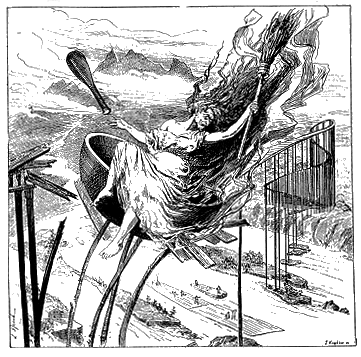
Don Cornelius isn't afraid of the Terrible Head! (This was one of the top image search results for "The Terrible Head." No joke.)
This peculiar tale from Andrew Lang’s Blue Fairy Book is strongly flavored with cruelty, as well as Greek and Roman mythology. See how many different myths you can name as you read. (I count two in this first section alone.)
The Terrible Head
ONCE upon a time there was a king whose only child was a girl. Now the King had been very anxious to have a son, or at least a grandson, to come after him, but he was told by a prophet whom he consulted that his own daughter’s son should kill him. This news terrified him so much that he determined never to let his daughter be married, for he thought it was better to have no grandson at all than to be killed by his grandson. He therefore called his workmen together, and bade them dig a deep round hole in the earth, and then he had a prison of brass built in the hole, and then, when it was finished, he locked up his daughter. No man ever saw her, and she never saw even the fields and the sea, but only the sky and the sun, for there was a wide open window in the roof of the house of brass. So the Princess would sit looking up at the sky, and watching the clouds float across, and wondering whether she should ever get out of her prison. Now one day it seemed to her that the sky opened above her, and a great shower of shining gold fell through the window in the roof, and lay glittering in her room. Not very long after, the Princess had a baby, a little boy, but when the King her father heard of it he was very angry and afraid, for now the child was born that should be his death. Yet, cowardly as he was, he had not quite the heart to kill the Princess and her baby outright, but he had them put in a huge brass-bound chest and thrust out to sea, that they might either be drowned or starved, or perhaps come to a country where they would be out of his way.
So the Princess and the baby floated and drifted in the chest on the sea all day and night, but the baby was not afraid of the waves nor of the wind, for he did not know that they could hurt him, and he slept quite soundly. And the Princess sang a song over him, and this was her song:
“Child, my child, how sound you sleep! Though your mother’s care is deep, You can lie with heart at rest In the narrow brass-bound chest; In the starless night and drear You can sleep, and never hear Billows breaking, and the cry Of the night-wind wandering by; In soft purple mantle sleeping With your little face on mine, Hearing not your mother weeping And the breaking of the brine.”
Well, the daylight came at last, and the great chest was driven by the waves against the shore of an island. There the brass-bound chest lay, with the Princess and her baby in it, till a man of that country came past, and saw it, and dragged it on to the beach, and when he had broken it open, behold! there was a beautiful lady and a little boy. So he took them home, and was very kind to them, and brought up the boy till he was a young man. Now when the boy had come to his full strength the King of that country fell in love with his mother, and wanted to marry her, but he knew that she would never part from her boy. So he thought of a plan to get rid of the boy, and this was his plan: A great Queen of a country not far off was going to be married, and this king said that all his subjects must bring him wedding presents to give her. And he made a feast to which he invited them all, and they all brought their presents; some brought gold cups, and some brought necklaces of gold and amber, and some brought beautiful horses; but the boy had nothing, though he was the son of a princess, for his mother had nothing to give him. Then the rest of the company began to laugh at him, and the King said: “If you have nothing else to give, at least you might go and fetch the Terrible Head.”
The boy was proud, and spoke without thinking:
“Then I swear that I WILL bring the Terrible Head, if it may be brought by a living man. But of what head you speak I know not.”
Then they told him that somewhere, a long way off, there dwelt three dreadful sisters, monstrous ogrish women, with golden wings and claws of brass, and with serpents growing on their heads instead of hair. Now these women were so awful to look on that whoever saw them was turned at once into stone. And two of them could not be put to death, but the youngest, whose face was very beautiful, could be killed, and it was HER head that the boy had promised to bring. You may imagine it was no easy adventure.
But the boy was up to it, wasn’t he? Or WAS HE? Find out!






